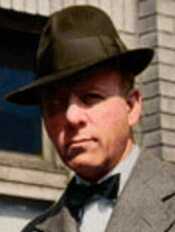The Evening Star (December 7, 1945)

Lawrence: Pearl Harbor lesson on anniversary
Congress must accept blame for neglect
By David Lawrence
Four years have passed since the Japanese attacked Pearl Harbor and yet there is no unanimity of opinion and no conclusive evidence as to how it happened and what preceded the tragedy.
During the war it was a part of the official propaganda to declare merely that it was a “sneak attack.” The American people were taught to believe that the entire responsibility for the tragedy was on the Japanese militarists and on a couple of our own officers in the Army and Navy who failed to mobilize our forces in time.
Today the story is being pieced together by a congressional committee. It reveals that the responsibility cannot be imposed on two individuals but upon the War and Navy Departments as well as the State Department. It reveals that the negotiations with Japan appeared to be futile before they began and yet the armed forces of the United States were unprepared for the attack.
As a matter of fact, every surprise attack is a “sneak attack” and, from a purely military standpoint, surprise is an important element. Hence the Japanese are credited in the testimony of our own officers with having achieved a well-coordinated and well-executed maneuver with their carrier aircraft.
Politics and attitudes
Japanese sea power demolished our fleet at Pearl Harbor and then went its triumphant way down to the Netherlands East Indies. As Adm. Halsey so picturesquely testified this week in opposing the proposed administrative merger of the armed services, Japanese sea power was what set us back for several months until American sea power could be built up.
But why didn’t the United States – the wealthiest nation on earth – have adequate protection by carriers and land-based planes? Why, as Gen. Marshall testified, did the United States have so few land-based bombers available? This is a part of the story which goes deep into American politics and American attitudes toward foreign countries and toward preparedness.
When President Truman said the American people were responsible for what happened at Pearl Harbor as much as were our military forces, he was presumably not trying to shield any individual or offer an alibi, though this is how it was widely interpreted. Many persons with political axes to grind had been trying to accuse the late President Roosevelt of provoking the Japanese so we could be drawn into the war. This was a baseless accusation and nothing has been adduced to support it.
The State Department, however, had kept its negotiations secret. It did not tell the American people about them. A fear of being alarmist evidently prevailed and yet suppression of the true facts did help to catch America off guard.
In Congress, whenever warnings against Japanese were made before 1941, there was a tendency to soft-pedal testimony from Army and Navy officers. Their recommendations for more defense weapons were often disregarded. While, on the other hand, the Budget Bureau slashed the request· of the Army and Navy for funds, Congress often restored them, but rarely ever beyond what the Army and Navy asked for.
Big unanswered question
The big unanswered question nevertheless is why the Army and Navy between 1930 and 1941 didn’t insist on larger appropriations as against Japanese plans. The customary answer heard – as it was about fortifying Guam – is that there was no use proposing to Congress any such appropriations because they wouldn’t be approved.
But why couldn’t Congress vote the funds to build land-based airplanes and carriers and a modern fleet big enough to prevent what happened at Pearl Harbor and in the Far East, where Gen. MacArthur’s forces were caught by surprise, too, and couldn’t defend themselves effectively?
It was because the American people were not prepared for eventualities in the Pacific. Members of Congress thought they, by their attitudes and votes, reflected public sentiment. Indeed, just a few weeks before Pearl Harbor the House of Representatives, recording a huge Republican vote, nearly killed Selective Service legislation. It was retained by the margin of one vote even though the whole world was aflame with war and the threats to us were on the horizon.
The American people trust their government departments and their chiefs of armed forces to prepare for war. They cannot handle these matters except by delegating authority to their elected agents. The Congress in power not only in 1941 but in the years preceding must accept its responsibility for neglecting the chief task allocated to them by their constituents – the defense of the United States. That’s the principal lesson learned after four years.